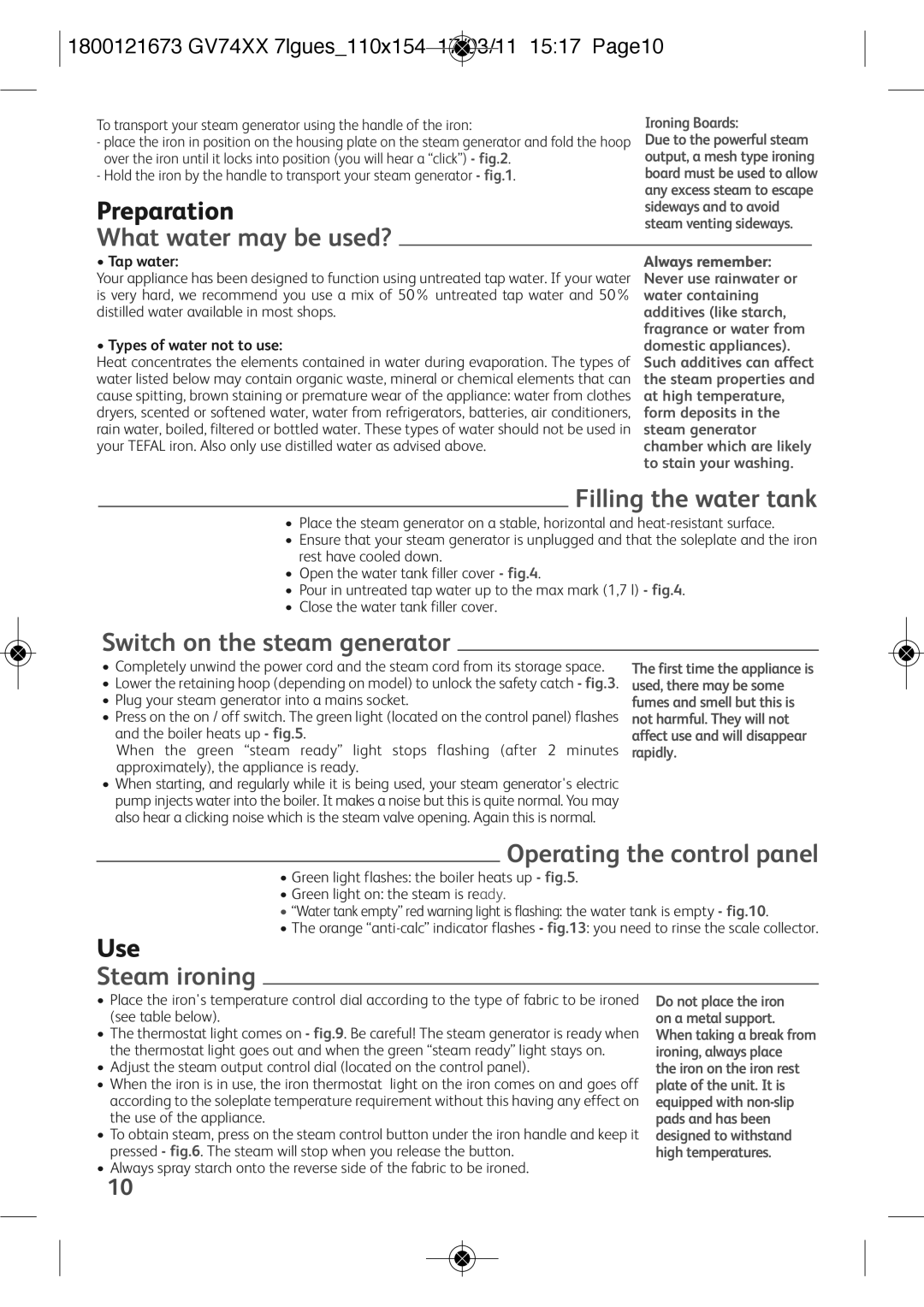
 1800121673 GV74XX 7lgues_110x154 17/03/11 15:17 Page10
1800121673 GV74XX 7lgues_110x154 17/03/11 15:17 Page10
To transport your steam generator using the handle of the iron:
-place the iron in position on the housing plate on the steam generator and fold the hoop over the iron until it locks into position (you will hear a “click”) - fig.2.
-Hold the iron by the handle to transport your steam generator - fig.1.
Preparation
What water may be used?
Ironing Boards:
Due to the powerful steam output, a mesh type ironing board must be used to allow any excess steam to escape sideways and to avoid steam venting sideways.
• Tap water:
Your appliance has been designed to function using untreated tap water. If your water is very hard, we recommend you use a mix of 50% untreated tap water and 50% distilled water available in most shops.
• Types of water not to use:
Heat concentrates the elements contained in water during evaporation. The types of water listed below may contain organic waste, mineral or chemical elements that can cause spitting, brown staining or premature wear of the appliance: water from clothes dryers, scented or softened water, water from refrigerators, batteries, air conditioners, rain water, boiled, filtered or bottled water. These types of water should not be used in your TEFAL iron. Also only use distilled water as advised above.
Always remember: Never use rainwater or water containing additives (like starch, fragrance or water from domestic appliances). Such additives can affect the steam properties and at high temperature, form deposits in the steam generator chamber which are likely to stain your washing.
Filling the water tank
•Place the steam generator on a stable, horizontal and
•Ensure that your steam generator is unplugged and that the soleplate and the iron rest have cooled down.
•Open the water tank filler cover - fig.4.
•Pour in untreated tap water up to the max mark (1,7 l) - fig.4.
•Close the water tank filler cover.
Switch on the steam generator
•Completely unwind the power cord and the steam cord from its storage space.
•Lower the retaining hoop (depending on model) to unlock the safety catch - fig.3.
•Plug your steam generator into a mains socket.
•Press on the on / off switch. The green light (located on the control panel) flashes and the boiler heats up - fig.5.
When the green “steam ready” light stops flashing (after 2 minutes approximately), the appliance is ready.
•When starting, and regularly while it is being used, your steam generator's electric pump injects water into the boiler. It makes a noise but this is quite normal. You may also hear a clicking noise which is the steam valve opening. Again this is normal.
The first time the appliance is used, there may be some fumes and smell but this is not harmful. They will not affect use and will disappear rapidly.
Operating the control panel
•Green light flashes: the boiler heats up - fig.5.
•Green light on: the steam is ready.
•“Water tank empty” red warning light is flashing: the water tank is empty - fig.10.
•The orange
Use
Steam ironing
•Place the iron's temperature control dial according to the type of fabric to be ironed (see table below).
•The thermostat light comes on - fig.9. Be careful! The steam generator is ready when the thermostat light goes out and when the green “steam ready” light stays on.
•Adjust the steam output control dial (located on the control panel).
•When the iron is in use, the iron thermostat light on the iron comes on and goes off according to the soleplate temperature requirement without this having any effect on the use of the appliance.
•To obtain steam, press on the steam control button under the iron handle and keep it pressed - fig.6. The steam will stop when you release the button.
•Always spray starch onto the reverse side of the fabric to be ironed.
Do not place the iron on a metal support. When taking a break from ironing, always place the iron on the iron rest plate of the unit. It is equipped with
10
